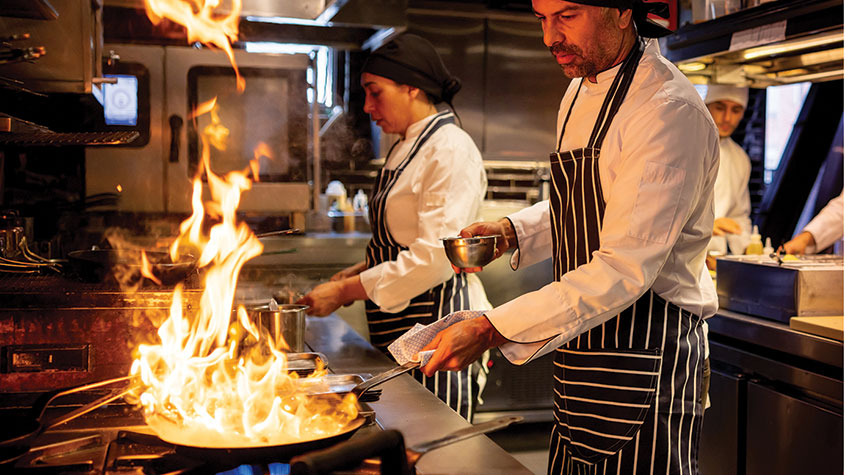Brace yourself for the return of rationing
Russia is turning off the cheap energy. That is already leading to belt-tightening, says Matthew Lynn. Who will suffer most, and which sectors will thrive?


Get the latest financial news, insights and expert analysis from our award-winning MoneyWeek team, to help you understand what really matters when it comes to your finances.
You are now subscribed
Your newsletter sign-up was successful
Want to add more newsletters?

Twice daily
MoneyWeek
Get the latest financial news, insights and expert analysis from our award-winning MoneyWeek team, to help you understand what really matters when it comes to your finances.

Four times a week
Look After My Bills
Sign up to our free money-saving newsletter, filled with the latest news and expert advice to help you find the best tips and deals for managing your bills. Start saving today!
Right across Europe, governments are cutting back on power usage to get ready for what looks likely to be a harsh winter.
Berlin has stopped illuminating public monuments at night; Hanover has switched off the hot water in showers in public buildings. Paris is stopping illuminated signs and preventing shops from running the air conditioning while their doors are open. The Spanish are ditching their ties to make stuffy offices more bearable.
Why? Russia has reduced its supplies of gas into Europe, making it impossible to fill crucial storage facilities over the summer, and may well limit supplies even further over the winter when demand is at its highest. Emergency plans are being put in place to cope with that, mainly by rationing the use of energy.
MoneyWeek
Subscribe to MoneyWeek today and get your first six magazine issues absolutely FREE

Sign up to Money Morning
Don't miss the latest investment and personal finances news, market analysis, plus money-saving tips with our free twice-daily newsletter
Don't miss the latest investment and personal finances news, market analysis, plus money-saving tips with our free twice-daily newsletter
A Covid-like blow to the economy
That is going to have a huge impact on the economy in particular sectors, and on specific companies. It will be just as much of a blow as the Covid-19 lockdowns. The UK is less at risk than Germany, France and Italy. But that doesn’t mean it can’t happen here or that we won’t be affected by closures on the other side of the Channel. Investors and businesses need to prepare for the rationing economy.
How? First, avoid heavy industry. There are a handful of power-hungry industries that can put production on hold for a month or two, or that can ship in supplies from elsewhere, without the world coming to a standstill. Chemicals, for example, or steel, or building materials, or paper and pulp manufacturing. Many of the biggest German chemical plants use as much energy by themselves as medium-sized towns. Many of them can be closed for a few weeks. Sure, that will snarl up supply chains, especially on construction sites where work may have to stop as well. And companies will take a huge hit to their profits as they will almost certainly have to keep paying their staff (although some form of furlough scheme may be available). But it will be the easiest way for governments to save a lot of power with a single measure.
Next, avoid energy-intensive services. Shops use relatively small amounts of energy, so long as they turn the heating down and don’t leave the doors open in the winter. Garages don’t use a lot of electricity. Other services use far more. A gym needs a lot of showers and it requires hot water. Restaurants burn up a lot of power in the kitchen. Car washes are energy intensive and hardly essential and the same is true of all those sunbed salons on the high street. In a second round of closures, many high-energy, non-essential services may find themselves limited to operating three days a week if they are not closed down completely – and their profits will be hammered.
Third, expect a return to working from home. Transport networks use a lot of power, and so do offices. Where possible, they may well be closed down. In fact, the rationing economy will look a lot like the Covid-19 lockdown except with restrictions on all those fuel-hungry home deliveries.
The sectors that will do well
Finally, investors should consider those essential industries where the electricity will keep flowing. There are plenty of sectors we simply can’t do without. Food and drink manufacturing, for example. The supermarkets. Hospitals and healthcare facilities will run as normal no matter how much power they are consuming. The broadcasters will still be working to keep us all entertained and no one is going to switch the internet off (although bitcoin may go up in price as it is hard to imagine anyone will be allowed to mine any more, at least in Europe).
Essential, basic industries and services may not exactly thrive, but they will do a lot better than most others. Likewise, expect companies generating alternative energy, especially wind and solar, to boom.
Energy rationing will hit the economy hard. Some estimates suggest Germany could see a 7% fall in output; it could even be a lot higher than that. But the impact will be uneven. Companies and investors need to start getting ready for that now – and long before winter approaches.
Get the latest financial news, insights and expert analysis from our award-winning MoneyWeek team, to help you understand what really matters when it comes to your finances.

Matthew Lynn is a columnist for Bloomberg and writes weekly commentary syndicated in papers such as the Daily Telegraph, Die Welt, the Sydney Morning Herald, the South China Morning Post and the Miami Herald. He is also an associate editor of Spectator Business, and a regular contributor to The Spectator. Before that, he worked for the business section of the Sunday Times for ten years.
-
 How a ‘great view’ from your home can boost its value by 35%
How a ‘great view’ from your home can boost its value by 35%A house that comes with a picturesque backdrop could add tens of thousands of pounds to its asking price – but how does each region compare?
-
 What is a care fees annuity and how much does it cost?
What is a care fees annuity and how much does it cost?How we will be cared for in our later years – and how much we are willing to pay for it – are conversations best had as early as possible. One option to cover the cost is a care fees annuity. We look at the pros and cons.
-
 UK wages grow at a record pace
UK wages grow at a record paceThe latest UK wages data will add pressure on the BoE to push interest rates even higher.
-
 Trapped in a time of zombie government
Trapped in a time of zombie governmentIt’s not just companies that are eking out an existence, says Max King. The state is in the twilight zone too.
-
 America is in deep denial over debt
America is in deep denial over debtThe downgrade in America’s credit rating was much criticised by the US government, says Alex Rankine. But was it a long time coming?
-
 UK economy avoids stagnation with surprise growth
UK economy avoids stagnation with surprise growthGross domestic product increased by 0.2% in the second quarter and by 0.5% in June
-
 Bank of England raises interest rates to 5.25%
Bank of England raises interest rates to 5.25%The Bank has hiked rates from 5% to 5.25%, marking the 14th increase in a row. We explain what it means for savers and homeowners - and whether more rate rises are on the horizon
-
 UK inflation remains at 8.7% ‒ what it means for your money
UK inflation remains at 8.7% ‒ what it means for your moneyInflation was unmoved at 8.7% in the 12 months to May. What does this ‘sticky’ rate of inflation mean for your money?
-
 Would a food price cap actually work?
Would a food price cap actually work?Analysis The government is discussing plans to cap the prices of essentials. But could this intervention do more harm than good?
-
 The cost of petrol in the UK compared with the rest of the world
The cost of petrol in the UK compared with the rest of the worldNews The price of petrol in the UK went through the roof last year, but has since settled. We look at how UK petrol price compares with the rest of the world.